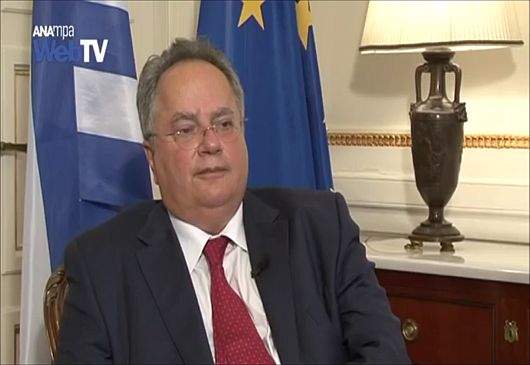 JOURNALIST: I would like to ask about Mr. Juncker’s statement. He said, essentially, that a ‘no’ in the referendum would mean ‘no to Europe,’ but he also said that a ‘no’ would be tantamount to suicide.
JOURNALIST: I would like to ask about Mr. Juncker’s statement. He said, essentially, that a ‘no’ in the referendum would mean ‘no to Europe,’ but he also said that a ‘no’ would be tantamount to suicide.
N. KOTZIAS: I think that right now Europe seems to be a little angry, because the Greek people, in democracy’s birthplace, want, via democratic means, to respond to the attacks the country is coming under and express their will not to accept austerity measures and the continuation of a policy that destroyed the country. As a result, the ‘no’ means that we are defending a different future for our country, which will not be constant austerity and recession, but growth within the framework of the EU.
I am very surprised that the European leaders are saying that the referendum means exiting Europe, while there are a number of EU member states that, for decades now, have carried out referendums – countries like Denmark, Ireland (which has had three), France, Holland – and referendums, in fact, that rejected the European constitution. Ireland, as the 21st country that was to approve the Lisbon Treaty, rejected the treaty and negotiations were held again.
Once again, what is normal for every other country in the EU is being portrayed by Brussels as illegal, as recalcitrance, as an inclination on the part of Greece to leave the EU. France rejected the constitution, the fundamental rule of the EU, and no one said France wants to leave the EU. Ireland made 20 countries that had already voted vote again on the changes made to the Treaty based on the Irish referendum. It is only wicked when we do it. Because the domestic forces allow this, attempting, through the referendum, to pose false dilemmas for the country in order not to defend the content of the agreement to the extent they should have. Apparently, they are ashamed of not having defended the content of the agreement.
JOURNALIST: And Ms. Merkel wasn’t particularly “tender” towards us. She accused the Greek government of a lack of willingness to compromise, saying that if the euro fails, Europe fails.
N. KOTZIAS: I think Ms. Merkel is more interested right now in who will be blamed for any problem that arises, rather than in the real solution of the problems, to come back to the willingness of a European politician to reach compromises. She accuses us of not wanting compromises. On Tuesday, we accepted serious retreats and compromise, and it was said we would reach an agreement on Thursday. The forces of recession and austerity appeared at the Eurogroup on Wednesday with additional new proposals – and led, in fact, by the IMF. So they shouldn’t talk to us about compromise. We are a government and a state that has shown many, many times that we know the culture of compromise, which we need and implement.
JOURNALIST: Regarding the meetings you had today with the ambassadors of the European countries, including Norway and Switzerland.
N. KOTZIAS: There are the EU member states, Norway, Switzerland, Israel, Russia, China, the U.S. And I have had a series of conversations with my counterparts. I just talked to the German Foreign Minister, Frank-Walter Steinmeier. Afterwards I will talk to the Russian Foreign Minister, Sergey Lavrov, Fabius, from France, and a number of others.
In all these cases, I am trying to send the Greek government’s message: that our referendum concerns the democratic right of our people to voice and opinion; it concerns the fate of the proposal of the three institutions, which we consider to be unacceptable; and it does not at all concern Greece’s position in Europe; it does not at all concern the fairytales about a Grexit. And, mainly: They should stop making such a fuss about a very natural event. The expression of the democratic will of our people on what is a burning issue for us. Moreover, it needs to be understood that, in the EU, every member state has many tools: Recourse to the European courts, veto, referendums, compromise, negotiation. I can’t understand why Europe should panic. Were we a little unpredictable? That is, did they expect us to have backed down on everything, and that’s why they’re upset?
JOURNALIST: We read your two personal tweets, particularly regarding the veto, that Greece also has a veto.
N. KOTZIAS: I wrote a long time ago that Greece is a country that has the same rights as any other country. If countries like France have exercised their veto with regard to where the European Parliament will be located in Strasbourg – I was present at such a discussion at the Council of Foreign Ministers, some years ago – then we have the same right in defence of our fundamental national rights and interests.
JOURNALIST: How would you respond to all those who – here in Greece and abroad – are transforming the referendum into the question “euro or drachma”, “Europe or Grexit”?![]()
N. KOTZIAS: There are two currents in Greece, and I reject both. The one says that if we want to confront Europe, we have to leave the euro here and now. The other current says that, in order not to leave the euro, we have to submit to and surrender to Europe. For me there is neither an exit from the euro, nor submission to the bureaucracy of Europe. For me there is Europe as a battlefield on which I use all of the tools allowed to me by the institutions, the treaties, the agreements with the EU.
June 30, 2015


